Related Research Articles
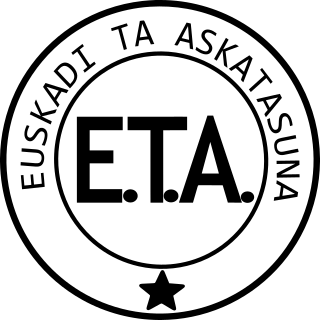
ETA, an acronym for Euskadi Ta Askatasuna, was an armed Basque nationalist and far left separatist organization in the Basque Country between 1959 and 2018. The group was founded in 1959 and later evolved from a group promoting traditional Basque culture to a paramilitary group engaged in a violent campaign of bombing, assassinations, and kidnappings throughout Spanish territory and especially in the Southern Basque Country. Its goal was gaining independence for the Basque Country. ETA was the main group within the Basque National Liberation Movement and was the most important Basque participant in the Basque conflict.
Batasuna was a Basque nationalist political party. Based mainly in Spain, it was banned in 2003, after a court ruling declared proven that the party was financing ETA with public money.

The Basque Nationalist Party, officially Basque National Party in English, is a Basque nationalist and regionalist political party. The party is Christian-democratic, with social-democratic and conservative-liberal factions. It operates in all the territories comprising the Basque Country: the Basque Autonomous Community and Navarre in Spain, and in the French Basque Country. It also has delegations in dozens of foreign nations, specifically those with a major presence of Basque immigrants.

The Basque Country is the name given to the home of the Basque people. The Basque country is located in the western Pyrenees, straddling the border between France and Spain on the coast of the Bay of Biscay. Euskal Herria is the oldest documented Basque name for the area they inhabit, dating from the 16th century.
Abertzale is a Basque term usually referring to people or political groups who are associated with Basque nationalism.
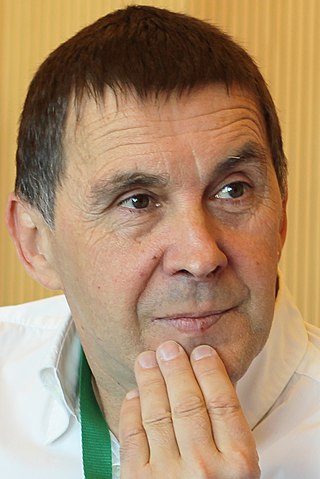
Arnaldo Otegi Mondragón is a Basque politician who is currently General Secretary of Basque nationalist party EH Bildu. He was member of the Basque Parliament for both Herri Batasuna and Euskal Herritarrok. He was one of the key negotiators during the unsuccessful peace talks in Loiola and Geneva, in 2006.

The Communist Party of the Basque Homelands was a communist Basque separatist party in the Basque Country, Spain. The party was outlawed by the Spanish Supreme Court in 2008 after it was judicially proven to be part of Batasuna and, ultimately, ETA.
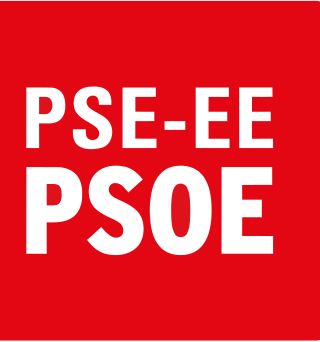
The Socialist Party of the Basque Country–Basque Country Left is a social-democratic political party in the Basque Country that acts as the regional affiliate of the Spanish Socialist Workers' Party (PSOE).
The Basque National Liberation Movement was an umbrella term that comprised all social, political and armed organizations orbiting around the ideas of the illegal armed organisation Euskadi Ta Askatasuna (ETA), proscribed internationally as a terrorist organisation.

Basque Nationalist Action is a Basque nationalist party based in Spain. Founded in 1930, it was the first Basque nationalist political party to exist running on a socialist program. On 16 September 2008, the party was outlawed by the Spanish Supreme Court based on ties with ETA. The Spanish ruling was appealed to the European Court of Human Rights, which, after reviewing the question, upheld the Spanish courts on the matter.
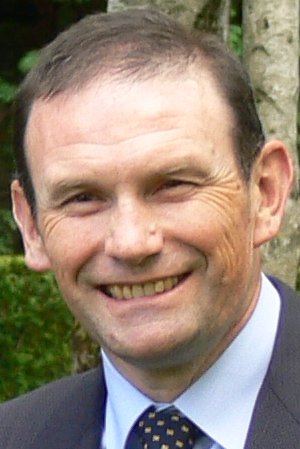
The 2005 Basque regional election was held on Sunday, 17 April 2005, to elect the 8th Parliament of the Basque Autonomous Community. All 75 seats in the Parliament were up for election.

Askatasuna is a Basque political party registered on 31 August 1998, outlawed in 2009 by the Audiencia Nacional under the 2002 Political Parties Law.

The 2009 Basque regional election was held on Sunday, 1 March 2009, to elect the 9th Parliament of the Basque Autonomous Community. All 75 seats in the Parliament were up for election. The election was held simultaneously with a regional election in Galicia. It would be the first time that the elections for two of the Spanish "historical regions"—namely, those comprising Andalusia, Catalonia, Galicia and the Basque Country itself—were held simultaneously. This would evolve into an unwritten convention in subsequent years, with Basque and Galician elections being held concurrently in 2012, 2016 and 2020.

The Basque conflict, also known as the Spain–ETA conflict, was an armed and political conflict from 1959 to 2011 between Spain and the Basque National Liberation Movement, a group of social and political Basque organizations which sought independence from Spain and France. The movement was built around the separatist organization ETA, which had launched a campaign of attacks against Spanish administrations since 1959. ETA had been proscribed as a terrorist organization by the Spanish, British, French and American authorities at different moments. The conflict took place mostly on Spanish soil, although to a smaller degree it was also present in France, which was primarily used as a safe haven by ETA members. It was the longest running violent conflict in modern Western Europe. It has been sometimes referred to as "Europe's longest war".

The 2012 Basque regional election was held on Sunday, 21 October 2012, to elect the 10th Parliament of the Basque Autonomous Community. All 75 seats in the Parliament were up for election. The election was held simultaneously with a regional election in Galicia. Lehendakari Patxi López announced the parliament's dissolution half a year ahead of schedule as a result of the People's Party (PP) withdrawing their support from his government, prompting Galician president Alberto Núñez Feijóo, who had been scheduling a snap election in Galicia to be held at some point throughout late 2012, to make his decision to have a simultaneous vote.
EH Bildu, short for Euskal Herria Bildu is a left-wing, Basque nationalist, pro-independence political coalition active in the Spanish autonomous communities of Basque Country, Navarre and Burgos Province.

Abertzale left is a term used to refer to the parties or organizations of the Basque nationalist/separatist left, stretching from democratic socialism to communism.
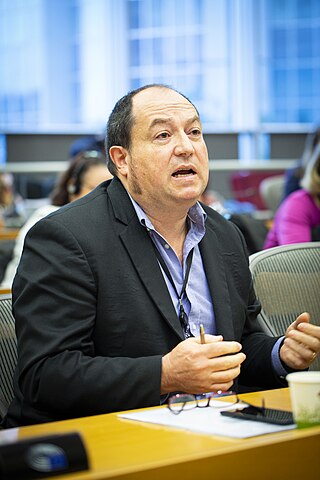
Joxe Pernando Barrena Arza is a Basque politician, former member of the Parliament of Navarre and former member of the European Parliament for Spain.

Hasier Arraiz Barbadillo is a Spanish politician from the Basque Country. He was the first president of Sortu, and a member of the Basque Parliament.
References
- 1 2 3 "Aranburu Olabarrieta, Maite". Basque Parliament (in Basque). Retrieved 2023-01-23.
- 1 2 "El PCTB diu que «les veus que han estat il·legalitzades s'escoltaran al Parlament»" [The PCTB says that "the voices that have been outlawed will be heard in Parliament"]. Diari de Balears (in Catalan). 2005-04-18. Retrieved 2023-01-23.
- ↑ "La Cámara vasca estará integrada por 38 mujeres y 37 hombres" [The Basque Chamber will be made up of 38 women and 37 men]. El Mundo (in Spanish). April 18, 2005. Retrieved 2023-01-23.
- ↑ "Basque Nationalists Win Regional Election". Islamweb.net. April 18, 2005. Retrieved 2023-01-23.
- ↑ "El Supremo ilegaliza el Partido Comunista en país vasco" [The Supreme Court outlaws and dissolves the Communist Party of the Basque Lands]. RTVE (in Spanish). 2008-09-18. Retrieved 2023-01-23.
- ↑ Press, Europa (2009-02-18). "Siete parlamentarios de EHAK declaran como testigos por la relación del partido "con ETA-Batasuna"" [Seven EHAK parliamentarians testify as witnesses for the party's relationship "with ETA-Batasuna"]. Europa Press (in Spanish). Retrieved 2023-01-23.